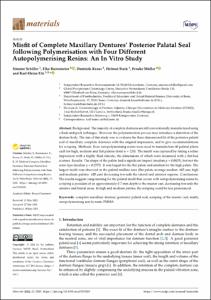Misfit of Complete Maxillary Dentures’ Posterior Palatal Seal following Polymerisation with Four Different Autopolymerising ResinsAn In Vitro Study

Misfit of Complete Maxillary Dentures’ Posterior Palatal Seal following Polymerisation with Four Different Autopolymerising Resins
An In Vitro Study

| dc.contributor.author | Schiller, Simone | |
| dc.contributor.author | Rustemeier, Elke | |
| dc.contributor.author | Kraus, Dominik | |
| dc.contributor.author | Stark, Helmut | |
| dc.contributor.author | Müller, Frauke | |
| dc.contributor.author | Utz, Karl-Heinz | |
| dc.date.accessioned | 2023-03-31T05:36:49Z | |
| dc.date.available | 2023-03-31T05:36:49Z | |
| dc.date.issued | 30.07.2022 | |
| dc.identifier.uri | https://hdl.handle.net/20.500.11811/10754 | |
| dc.description.abstract | Background: The majority of complete dentures are still conventionally manufactured using a flask-and-pack technique. However, the polymerization process may introduce a distortion of the denture body. The aim of this study was to evaluate the three-dimensional fit of the posterior palatal seal of maxillary complete dentures with the original impression, and to give recommendations for scraping. Methods: Four autopolymerising resins were used to manufacture 40 palatal plates each for high, medium and flat palates (total n = 120). The misfit was captured by taking a reline impression with a highly fluid silicone, the dimensions of which were measured with a flat-bed scanner. Results: The shape of the palate had a significant impact (median p = 0.0435), but not the resin type (median p = 0.2575). It was largest for the flat palate and smallest for the high palate. The largest misfit was observed in the palatal midline area (flat-palate average median: 685 µm; high and medium palates: 620 µm) decreasing towards the lateral and anterior regions. Conclusions: The results suggest compensating for the palatal misfit that occurs with autopolymerising resins by scraping a postdam of an approximately 0.7 mm depth to the master cast, decreasing towards the anterior and lateral areas. In high and medium palates, the scraping could be less pronounced. | en |
| dc.format.extent | 13 | |
| dc.language.iso | eng | |
| dc.rights | Namensnennung 4.0 International | |
| dc.rights.uri | http://creativecommons.org/licenses/by/4.0/ | |
| dc.subject | complete maxillary denture | |
| dc.subject | posterior palatal seal | |
| dc.subject | scraping of the master cast | |
| dc.subject | misfit | |
| dc.subject | autopolymerising acrylic resin | |
| dc.subject | PMMA | |
| dc.subject.ddc | 610 Medizin, Gesundheit | |
| dc.title | Misfit of Complete Maxillary Dentures’ Posterior Palatal Seal following Polymerisation with Four Different Autopolymerising Resins | |
| dc.title.alternative | An In Vitro Study | |
| dc.type | Wissenschaftlicher Artikel | |
| dc.publisher.name | MDPI | |
| dc.rights.accessRights | openAccess | |
| dcterms.bibliographicCitation.volume | 2022, vol. 15 | |
| dcterms.bibliographicCitation.issue | iss. 15 | |
| dcterms.bibliographicCitation.pagestart | 1 | |
| dcterms.bibliographicCitation.pageend | 13 | |
| dc.relation.doi | https://doi.org/10.3390/ma15155285 | |
| dcterms.bibliographicCitation.journaltitle | Materials | |
| ulbbn.pubtype | Zweitveröffentlichung | |
| dc.version | publishedVersion | |
| ulbbn.sponsorship.oaUnifund | OA-Förderung Universität Bonn |
Files in this item
This item appears in the following Collection(s)
-
Publikationen (5)




